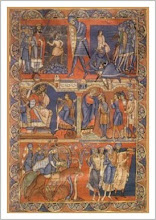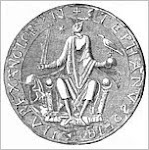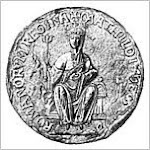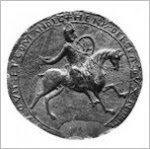• 1135-1138: A Coronation and Unrest Grows; Battle of the Standard
It was perhaps inevitable that a disputed succession would follow the death of Henry I in December 1135 given his unprecedented decision to nominate his daughter as his heir. One group of barons including Robert of Gloucester were in Normandy with Henry at the time of his death and they had been charged with the task of accompanying his body to Reading for burial, while Matilda and Geoffrey were in Anjou soothing their ruffled feathers after Henry's stubborn refusal to grant them custody of some key Norman castles which may have been helpful to their cause.
In the aftermath of Henry's demise a group of barons had been giving consideration to electing Count Theobald of Blois to the kingship but their deliberations were cut short when the news arrived of Stephen's stunning coup. Acting with a rare decisiveness and ruthlessness which belied his normally easygoing and affable nature, Stephen had hastily sailed for England and on his arrival in London, had been popularly elected king by the townspeople. It is thought that Henry of Blois, Abbot of Glastonbury and Bishop of Winchester, advised his brother and helped him to secure the treasury at Winchester. Perhaps they had plotted together in the years before Henry's death and had organised some sort of plan but without evidence this is just speculation. At any rate, they had promptly grabbed the opportunity which had presented itself, and with the support of Roger, Bishop of Salisbury and a landholder in East Anglia, a certain Hugh Bigod, the son of Roger Bigod, who claimed that he had been present at Henry's deathbed and the dying king had released the barons and the bishops from their oath of fealty to Matilda, Henry of Blois persuaded William of Corbeil, Archbishop of Canterbury to crown Stephen as king which took place on 22nd December 1135. The Archbishop would not live long enough to witness the ensuing difficulties this decision created. He died in 1136 and the position remained vacant until the appointment of Theobald of Bec in 1138. Stephen of Blois, with the help of the English clergy, had effectively usurped the throne of England.
For the first two years everything seemed to go well for Stephen. With the coronation over, Stephen gained the support of the majority of the barons, and he won the endorsement of Pope Innocent II. The clergy wrung a 'Charter of Liberties' from him as the price of their support. There were skirmishes in the north with King David of Scotland which ended with Stephen mistakenly ceding Carlisle which was held by Ranulf, Earl of Chester, and there was some unrest on the Welsh borders, but on the whole things had gone relatively smoothly. Doubt about Stephen's rulership abilities first appeared in an incident involving Baldwin de Redvers, who never accepted Stephen as king. He had seized Exeter and while Stephen's army had been able to take possession of the town the castle garrison held firm and Baldwin himself had escaped. It took three months to resolve this dispute and ended with Stephen raising the siege and allowing the rebels, including Baldwin's wife and children, to make submission and go unpunished. The result of this episode was that the clemency the King had shown horrified most of the barons who were present and Baldwin fled to Anjou and joined Matilda and Geoffrey's cause. Indeed, Matilda would eventually go on to create him 1st Earl of Devon, most likely in 1141 after the Battle of Lincoln. It was a prime indicator to the unruly barons that Stephen was too lenient and they could get away with quite a good deal. Unlicensed castles sprung up across the countryside and many barons waged private wars against one another with little regard for the effects that the destruction caused to ordinary people.
The Battle of the Standard:
On 22nd August 1138 at Cowdon Moor near Northallerton, North Yorkshire, the forces of King David's army met the English army led by William, Earl of Aumale in battle. In The Battle of the Standard the Scots were defeated and David and his surviving nobles and army retired to Carlisle. From here David was able to regroup and this enabled him to go on the offensive again. The siege of Wark continued until it was captured in November. David continued to occupy Cumberland and much of Northumberland.
Both sides would eventually meet each other at Durham and broker a settlement. In an agreement which, in effect, fulfilled David's ambitions it was decided that King Stephen would retain possession of the strategically important castles of Newcastle and Bamburgh while David would retain Carlisle and Cumberland. His son Henry was restored to the Earldom of Huntingdon and Lordship of Doncaster, and given the earldom of Northumberland. So in the end, what firstly appeared to be defeat turned out to be a satisfying victory in a different kind of way.
Despite these acquisitions King David stayed true to his word and continued to loyally uphold Matilda's claims to the throne after her arrival in England in 1139. He also appeared by her side during the months in London when the crown was tantalisingly within her grasp in 1141.
• Richard of Hexham's account of the Battle of the Standard
• UK Battlefields Resource Centre: Battle of Northallerton
04 August 2010
Subscribe to:
Post Comments (Atom)








No comments:
Post a Comment